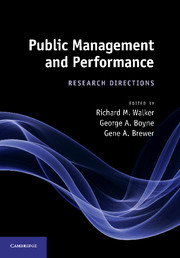Book contents
- Frontmatter
- Contents
- List of figures
- List of tables
- Notes on contributors
- 1 Introduction
- 2 Extending goal ambiguity research in government: from organizational goal ambiguity to programme goal ambiguity
- 3 Budgets and financial management
- 4 Organizational structure and public service performance
- 5 Red tape: the bane of public organizations?
- 6 Managerial networking, managing the environment, and programme performance: a summary of findings and an agenda
- 7 Public service motivation and performance
- 8 Organizational diversity and public service performance
- 9 Performance management: does it work?
- 10 Strategy: which strategic stances matter?
- 11 Methods
- 12 Conclusion: enriching the field
- Index
- References
11 - Methods
Published online by Cambridge University Press: 05 July 2014
- Frontmatter
- Contents
- List of figures
- List of tables
- Notes on contributors
- 1 Introduction
- 2 Extending goal ambiguity research in government: from organizational goal ambiguity to programme goal ambiguity
- 3 Budgets and financial management
- 4 Organizational structure and public service performance
- 5 Red tape: the bane of public organizations?
- 6 Managerial networking, managing the environment, and programme performance: a summary of findings and an agenda
- 7 Public service motivation and performance
- 8 Organizational diversity and public service performance
- 9 Performance management: does it work?
- 10 Strategy: which strategic stances matter?
- 11 Methods
- 12 Conclusion: enriching the field
- Index
- References
Summary
Introduction
The preceding chapters have identified many ways that the study of public management and performance has grown both in scope and complexity, opening doors for continued theoretical advancement. Our knowledge of how the behaviour of public managers can affect organizational outcomes has grown substantially, and as a field, public management continues to develop. We have seen the ways in which questions of networks and governance have altered how we think about and study public management, and these lines of inquiry have offered incredible opportunities to ask new and interesting questions. These theoretical advancements have also led us to pursue new and better data on the behaviour of public managers and the outcomes they seek to affect. This increase in the availability of data has led to a diversification of methodological techniques employed in public management research, many of which have greatly expanded our ability to explore the multifaceted relationship between management and performance.
This chapter offers a discussion of the ways in which different methodological approaches could push our thinking into new areas of research – a discussion that will begin with two important caveats. First, I am not a methodologist, and this discussion is not written for methodologists. This chapter is simply an effort to encourage management researchers to consider different approaches and how those approaches can steer our thinking into new areas. This is not an attempt to be comprehensive, but it is a simple effort to spark conversation and creativity in thinking about future directions for research. Second, I realize that some may view this discussion as committing the unforgivable sin of encouraging scholars to learn a new trick and look for places to show it off. It is not.
Information
- Type
- Chapter
- Information
- Public Management and PerformanceResearch Directions, pp. 253 - 267Publisher: Cambridge University PressPrint publication year: 2010
